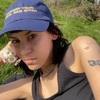“I hate it when dudes try to chase me,” King Princess begins, a little moustache drawn onto her upper lip, eyes staring into the camera like two clear blue planets, “But I love it when you try to save me / ‘cos I’m just a lady…” And then the warm piano bubbles into a froth, her voice sentimental, hazy guitars spread beneath 808 drums. It’s the kind of pop song I wish I’d listened to when I was a teen, when these kinds of feelings felt new and remarkable. My generation may have had Robyn’s Body Talk or Gaga among everything else, but much of that was music for the club, and it wasn't always particularly forthright. For teenagers today, though, the tide is starting to shift, and that shift is palpable.
Advertisement
King Princess isn’t the only musician to have released a monumental, tender pop song through a queer lens this year – specifically one made by, or else geared towards, teenagers. In June, Troye Sivan presented us with possibly the most lowkey highkey ode to first time bottoming with “Bloom” in which he sighs over bright, vaporous synths: “Promise me you’ll hold my hand if I get scared now / might tell you to take a second baby, slow it down.” The video makes him look like he’s just climbed out of a Caravaggio baroque painting, surrounded by limbs and flowers and lips painted like ripe fruit. It’s so good you want to blend the whole thing and drink it.There were a lot of others, too – far too many to go into right now. There was the sleepy-eyed intimacy of Iridescence album cut “Something About Him” from Brockhampton. There was Ryan Beatty rightfully giving boys in jeans their dues with “God in Jeans.” There was Hayley Kiyoko, who released an album this year called Expectations, the cover of which is her on a chair, literally staring at someone’s extremely velvety naked body. It was Kiyoko, in fact, who gave 2018 the nickname which appeared to stick among young fans, when she tweeted on January 1st: “It’s our year, it’s our time. To thrive and let our souls feel alive. #20GAYTEEN #EXPECTATIONS.” Looking back on the past 12 months, it’s easy to concede that she was right.But 20GAYTEEN isn’t just a music thing – it's bigger than that. This year also saw the release of a number of mainstream films with LGBTQ teens at their centre. Films such as Love, Simon, The Miseducation of Cameron Post and Boy Erased (which incidentally stars Troye Sivan, who also wrote the soundtrack) are brilliant, powerful depictions of what it means to be young and queer – whether in a chill, romantic comedy setting, or the harsher realities of having mega homophobic parents and being forced through conversion therapy. And all of these, of course, come following Call Me By Your Name, which arrived right at the tail-end of 2017, ushering in a new era of glorious blue-and-pink, peach-devouring, heart-altering, gay-as-fuck storytelling.
Advertisement
As I've said before though, speaking about queerness when it comes to art can be tricky. Hearing musicians increasingly using same-sex pronouns in their lyrics, for example, or seeing videos which stray away from heteronormative storylines, can make it tempting to bracket such things as a being part of a new wave or "trend". But pop culture has arguably evolved past these generalisations, and queerness (just like sexuality and romance in general!) is far too complex and fluid to categorise into neat little boxes. Instead, perhaps it’s more accurate to say that the net is widening to encompass a greater variety of perspectives, inch by inch, in different ways, every day. And this year, maybe more than ever, we’ve seen a whole bunch of music for teenagers get a whole lot gayer.It's also worth pointing out that 20GAYTEEN isn't just about there being more queer voices in pop – it's about the attitude towards those voices. Growing up in the 2000s, the word "gay” was always flung across playgrounds as an insult. If some boy at my school had admitted they were into, say, Mika, they would have probably got the piss ripped out of them. But that kind of overt homophobia isn't really considered the vibe anymore. You've got Troye and Hayley and Kehlani all over the Disney Channel. You've got straight dudes nerding out over Brockhampton, Frank Ocean and Tyler, the Creator. Queer art has always existed, because queer folk have always existed, but the fact that queerness is beginning to shed it's "otherness" within the mainstream sphere is something worth noting and celebrating.Obviously we've still got further to go. The queer peeps we see in mainstream pop are still overwhelming white, cisgender, able-bodied Americans. We don't yet live in some all-encompassing sexual utopia, where nobody ever flinches when you describe yourself as a "lesbian", or when you speak about sex in the unselfconscious way that cishet people do all the time.But it's really cool that teenagers today who might not identify as totally straight (which is a lot of them, apparently) have a pop culture landscape that increasingly speaks to the specifics of their own life. Because that's exactly what pop culture should be. It should be a vehicle for you to make sense of the world around you, of the relationships you'll get lost in, the structures you'll have to navigate, the loves you'll gain and lose and gain again, the years that will fly behind you. And if pop culture is a mirror, it makes sense that it would (and it should) hold more than one type of person's reflection.You can follow Daisy on Twitter and Marta on Instagram.
